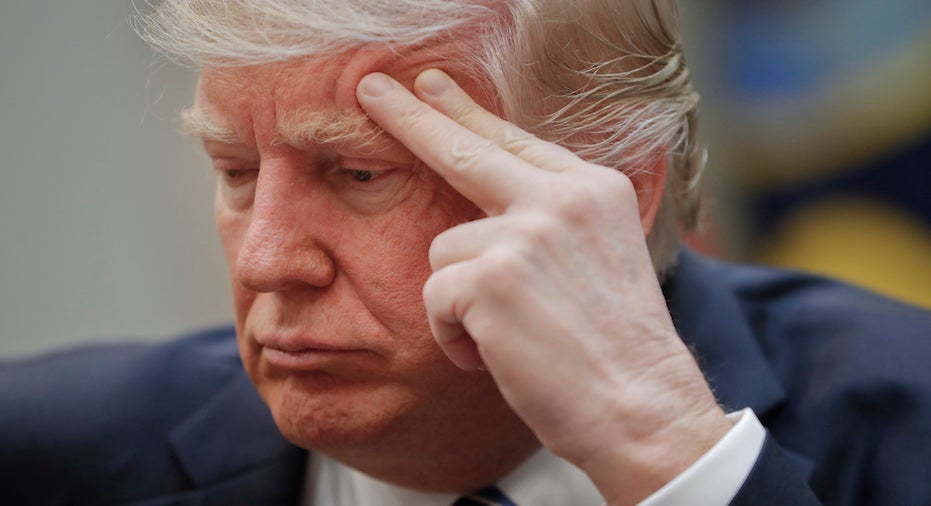Health Care Domino: Why Trump's Tax Cuts Depend on the ObamaCare Repeal

The House of Representatives Rules Committee is meeting Wednesday to set the stage for the big health care debate Thursday, when the full chamber will vote on a bill to repeal and replace former President Obama’s Affordable Care Act (ObamaCare). Some Republican lawmakers are banking on passage of the American Health Care Act in order to focus on another pivotal item of the Party’s agenda: tax reform.
President Trump has taken on the role of salesman this week, hosting meeting after meeting to rally GOP votes behind the bill.
On Wednesday morning the president tweeted:
Big day for healthcare. Working hard!
— Donald J. Trump (@realDonaldTrump) March 22, 2017
This tweet follows a dinner Tuesday night, where he urged Congress to keep its promises to Americans.
“The American people gave us clear instructions. It's time to get busy, get to work and get the job done … that legislative effort begins with Thursday's crucial vote and it really is a crucial vote for the Republican Party and for the people of the country,” Trump said.
The president, Treasury Secretary Steve Mnuchin and House Speaker Paul Ryan have each said health care reform must take place before the new administration can concentrate on its popular promise to cut taxes. Here is why.
The Budget
Under the budget resolution passed in January, GOP lawmakers can repeal sections of the Affordable Care Act with a simple majority of 51 votes in the Senate—Republicans have 52 seats—without the threat of a Democratic filibuster. They can do this through a procedure called reconciliation, a legislative process allowing for the repeal of certain pieces of a bill pertaining to the budget that permits only twenty hours of debate under Senate rules.
However, once the current fiscal year expires, Republicans lose that reconciliation directive and have to resubmit for permission at the outset of the next fiscal year.
One at a Time
Reconciliation allows Congress to consider just three items per fiscal year, whether they pertain to one bill or multiple. Those items are spending, revenue and debt limit.
Since the GOP also wants to pass its tax reform agenda using reconciliation, it cannot statutorily do that under this budget blueprint because the two policy measures overlap. Therefore, the administration plans to use the 2018 budget to pass tax reform through reconciliation, according to White House Press Secretary Sean Spicer. It plans to adopt the 2018 budget in May or June, which would mark the first time in the 43-year history of the Congressional budget process that Congress passed two budgets within the same year, according to Forbes.
“The limit they face is they cannot start tax reform reconciliation through the legislative process until the next budget resolution has been through both Houses,” Brian Riedl, former chief economist to Senator Bob Portman (R-OH), told FOX Business. “Tax reform reconciliation is on hold until they finish health care.”
Pushing back the timeline would put pressure on these windows. Not to mention, midterm elections are at the end of 2018, so there is no guarantee Republicans will maintain a majority in Congress through the following year.
Why Did Republicans Choose to do Health Care First?
Reconciliation requires a bill to reduce the deficit over the long-term. The Congressional Budget Office estimated the American Health Care Act would reduce federal deficits by $337 billion over the next ten years.
Tax reform, on the other hand, won’t be as straightforward.
“[Repealing the ACA first] would give them extra money to play around with for tax reform. Tax reform wouldn’t have to be revenue neutral. It would end up being revenue neutral on a dynamic level but the CBO doesn’t always measure all the dynamic effects,” Diana Furchtgott-Roth, former Trump transition team member and former chief economist for the U.S. Department of Labor, told FOX Business.
Speaker Ryan’s health care bill is designed to reduce taxes and spending, which will help improve deficit projections. The idea is health care will improve the baseline and pave the way for the tax overhaul, Paul Howard, senior fellow director in health policy at the Manhattan Institute, told FOX Business.
Timing
Mnuchin told FOX Business’ Maria Bartiromo last month he expects to see a tax reform bill by August.
As of Tuesday afternoon, Rep. Mark Meadows (R-NC) said the House Freedom Caucus still had 21 members who planned to vote against the health care overhaul. Senator Rand Paul (R-KY) also told FOX Business on Tuesday that he would not vote for the bill in its current form.
However, others remain optimistic the bill will move on to the Senate.
“I don't think Speaker Ryan will take this to the floor without the votes. If it goes there, I'd assume he's confident it will pass,” Howard said.
In order for the legislation to pass the House, the GOP needs to rally 216 votes.



















